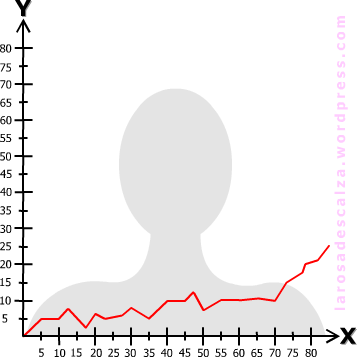I turned the corner located half a block from my house and I heard somebody yelling to another neighbor, ” Mercedes, they are giving out chicken instead of fish.” The piece of chicken that the Cuban State sells us at subsidize price and by their orders we must consume it in one month, is only a pound per person and anybody can eat it in a single meal. When they send chicken (I prefer this) in substitution for fish, the amount is eleven ounces per person for the same period of time.
Cuba is an archipelago and for this reason seafood shouldn’t be scarce, but because of the State’s indifference and ineptitude, we are suffering of shortages and rationing of these and other essential food items. Moreover, is it (the Yellowtail, the one always offered) the only marine species in the sea? And the lobsters, and the shrimp? And the high seas fish like the louvar, the kingfish and the tuna, etc? And the fish raised in the aquaculture dam lakes? And the freshwater ones?
It is like suffering from a prolonged and antagonistic irony of living on a poultry farm and keeping to a fish diet. In addition we are assigned half a pound of ground beef a month — it is more like a paste mixed with soy — half of mortadella (if we put it on a piece of bread, we can eat it as a snack) and 10 eggs per capita monthly. And the beef and the pork? And the lamb and the goat? So much inefficiency and manipulation didn’t affect our memories, because we know that there are a lot of species in the seas, and there are also varieties of poultry and different types of edible quadruped mammals.
It’s true that there is a parallel State market which retails some of the released products in national currency. But the prices are abusive and only a minority can acquire them. Also coexistent are the ones selling in foreign hard currency — the workers get paid a salary between 500 and 600 cuban pesos — where there’s a variety of meats, and a kilo of chicken costs $2.75 and a kilo of beef $9.50, but these prices are equally high, therefore out of reach for the average Cuban, who has to acquire the hard currency at 25 pesos for one CUC (equivalent to a dollar) in the currency exchanges. On top of this we have to add that not all of the stores sell these type of products and moreover, they are not always available.
The butchers, who in spite of their mediocre salaries almost all wear heavy gold chains — they look more like last generation rappers or reggae performers — and drive cars that cost around the same (sometimes more) than the ramshackle and stinky State meat markets where they work, pass days or maybe weeks waiting for the merchandise to arrive at their empty and impoverished retail establishments.
When the store is replenished there’s a private party, because from the day’s work “by error of the smart scales” and “other moves” with the suppliers, they will have enough merchandise left to auction on the overpriced black market. But they are only the result or part of the problem, which is the responsibility or irresponsibility of the authorities. The same way they imposed on us the “walking catfish,” meant to reduce our carnivorous cravings and like a terrestrial reptile it “walks” into backyards, sewers and paddocks and feeds on, among other things, feces and rats. God forbid! I don’t consume it, but I know a lot of my compatriots who actually do.
Cubans, who with our “bread diet” look “healthily plump,” already forgot the taste of beef, because here the cows, like in India, look like they are sacred, at least for the common citizen. They not prevented “the mad-cow” disease and the population “is mad” to recover its right to eat meat in the daily diet or with the frequency they can afford to pay for it — as it was before 1959 — not when the Cuban State decides the frequency and the amounts we can consume.
It looks like beef and other delights, are lacking because of “the bad governments” preceding them; thus the leaders “screwed it up” so concerned are they about our health that they got rid of it to insure our quality of life. Therefore, it is an acquired reflex that we must prioritize the color red only to digest politics and ideology. These nutritional limitations awakened our voracity for this vital food, because all these years they tried to implant in us, with neither Yin nor Yang, a vegetarian diet or macrobiotic without the right to respond or to choose it; but as with the problems with the seafood and the fact that we are an agricultural country, we also have difficulties with vegetables, grains and cereals, they couldn’t completely tame our taste and eating preferences.
For that reason a lot of nationals don’t care if the chicken is genetically modified, if the fish was floating “meekly” on a black scum and they assumed it was a donation from the British Petroleum; if we women start growing beards or our husbands start having high voices, as Evo Morales, the homophobic Bolivian President, said. Maybe some fellow citizens, who look like they have their stomach in the frontal lobe and their intelligence in “the elbow”, when it comes to food, stress that ” it doesn’t matter if the chicken has scales or the fish feathers, the fact is that it is meat”.
Translated by Adrian Rodriguez
June 27 2011




 There was a trend in Cuban born some years ago that redefined the concept of film: el murcinema or murcinélago. In other words, “bat-movie-goer.”
There was a trend in Cuban born some years ago that redefined the concept of film: el murcinema or murcinélago. In other words, “bat-movie-goer.”
 Cuban television debuts at its usual time of 9:00 in the evening, on the Cubavision channel, a telenovela–soap opera–titled “Under the Same Sun,” which is already generating a buzz. Although they haven’t provided much information about it, it’s said to consist of three stories. In the first one being aired, are the taboos and intolerance that still exist in society against homosexuality, among others. Some time ago an interdisciplinary team, taking advantage of the reach of this mass media, television, and with the support of the press, began influencing people with a different view of human sexual diversity. I celebrate the intention and the task, even more because a long time ago international organizations, such as the United Nations, and coalitions of countries, such as the European Union, jumped the barrier of segregation for sexual preferences and established legal mechanisms to prevent discriminatory practices in this and other aspects. We perceive in our country that perception is gradually changing in this regard.
Cuban television debuts at its usual time of 9:00 in the evening, on the Cubavision channel, a telenovela–soap opera–titled “Under the Same Sun,” which is already generating a buzz. Although they haven’t provided much information about it, it’s said to consist of three stories. In the first one being aired, are the taboos and intolerance that still exist in society against homosexuality, among others. Some time ago an interdisciplinary team, taking advantage of the reach of this mass media, television, and with the support of the press, began influencing people with a different view of human sexual diversity. I celebrate the intention and the task, even more because a long time ago international organizations, such as the United Nations, and coalitions of countries, such as the European Union, jumped the barrier of segregation for sexual preferences and established legal mechanisms to prevent discriminatory practices in this and other aspects. We perceive in our country that perception is gradually changing in this regard.